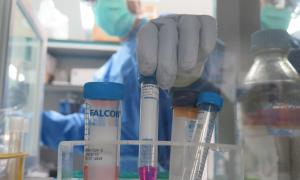More than 10% of people with severe SARS-CoV-2 infection have antibodies that boycott their own immune system

Researchers detect antibodies capable of blocking a key molecule in our body's defence against the SARS-CoV-2 –called interferon type 1 (IFN)–, a discovery that could explain the 10% of COVID-19 severe cases | The finding, a result of an international study, will make it possible to identify patients at risk of developing severe symptoms and to adapt the treatments to this patient profile
The symptoms caused by SARS-CoV-2 can greatly differ between people, ranging from asymptomatic infections to very severe pneumonias, or even death. Yesterday, the Science journal published an international study in which the Can Ruti Campus, with the Hospital Germans Trias i Pujol and IrsiCaixa –a centre promoted jointly by "la Caixa" Foundation and the Ministry of Health of the Government of Catalonia–, together with the Hospital Universitari MútuaTerrassa and the Fundació Docència i Recerca MútuaTerrassa, as well as the Hospital Universitario de Gran Canaria Dr Negrín, have participated. The study, led by INSERM and Rockefeller University, shows that 10.2% of people who go through the infection with severe symptoms have antibodies that block a molecule of the immune system: interferon type 1 (IFN). These autoantibodies would therefore be boycotting the functionality of the immune system in these patients. The finding has been possible thanks to the study of 987 blood samples, all from people who have been admitted for severe pneumonia caused by the new coronavirus in hospitals around the world, including Hospital Germans Trias i Pujol and Hospital Universitari MútuaTerrassa. The international team of researchers compared the results of this study with data from 663 asymptomatic people, none of whom had these autoantibodies, and from 1127 healthy individuals, of whom only 4 had them. The finding will identify which of the people with SARS-CoV-2 infection are most likely to develop severe symptoms. It will also make it easier to tailor treatments for these people with autoimmunity.
In a parallel way, today the Science journal also publishes an international study from the same consortium of researchers where, in addition, IDIBELL and Vall d'Hebron Barcelona Hospital Campus have also participated. The study shows that certain genetic alterations that affect the production of interferon would explain 3.5% of severe cases of COVID-19. Thus, researchers have identified the importance of IFN in the fight against SARS-CoV-2 and can explain why 15% of infections end up triggering a serious clinical case.
In the presence of a viral infection, some cells produce IFN, which acts as a warning signal to the immune system that, through an initial emergency response, will block the viral infection. After this blockage, a more sophisticated and specific response from the immune system itself will follow. "What aroused our curiosity were three patients with SARS-CoV-2 infection who developed severe pneumonia and who, due to a previous illness, we knew had antibodies that compromised their own immune system", explained Javier Martínez-Picado, ICREA researcher at IrsiCaixa, David Dalmau, researcher at the Hospital Universitario MútuaTerrassa and the MútuaTerrassa Teaching and Research Foundation, and Carlos Rodríguez-Gallego, researcher at the Hospital Universitario de Gran Canaria Dr Negrín, the three researchers from Spanish centres who are among the main authors of the article. "We thought...: could it be possible that these are not isolated cases and that this situation is the trigger for severe symptomatology in more people? And that is why we started to analyse whether more patients had these auto-antibodies", adds Martínez-Picado.
A compromised immune system
In order to find out whether autoantibodies are one of the reasons why patients are suffering from very severe COVID-19, the researchers have collected almost 3,000 samples from individuals around the world. They have proved that 10.2% of people with severe infection had autoantibodies which, instead of attacking the virus, attack the immune system itself, preventing it from functioning properly. "These antibodies are pre-infection, that is, people were already carriers and, as a result of this immune dysfunction, will have more severe and potentially fatal manifestations of the COVID-19. In other words, this alteration is the cause and not the consequence of the severity of the SARS-CoV-2 infection," explains Dalmau. Out of this 10.2%, most of the cases described are male. "This trend could link the production of IFN autoantibodies, prior to infection, to sex", says Rodriguez-Gallego.
Towards more personalized treatments
The clinical implications of the results of this study will be direct. Firstly, the simple fact of detecting these antibodies will make it possible to predict some of the patients who will end up developing severe symptoms. At the same time, whenever these patients donate blood, it will be necessary to check the presence of these auto-antibodies.
Interferons are in our body's first line of defence against SARS-CoV-2 infection. That is why, in some cases, they can be administered as a treatment for COVID-19. However, in the case of patients with autoantibodies, treatment with interferon is not effective, as these antibodies block the interferon. However, for patients with autoantibodies, interferon treatment is not effective, as these antibodies block the interferon. These patients, however, may receive more personalized treatments, with the aim of eliminating autoantibodies.